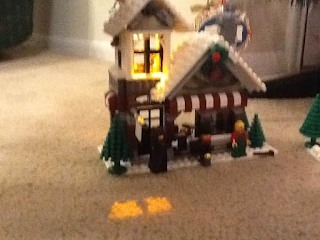Now, since I'm from the United States, I've been immersed in the American version of Christmas. I have a Christmas Tree with either an angel or star on top. I learned about Santa Claus and watched the strange stop motion animated features every year. Occasionally I set up an advent wreath and light the candles in the correct order.
But this wasn't how Christmas was always celebrated in the United States.
 |
Santa Claus wasn't even part of Colonial American culture.
Speaking of Santa Claus, I've heard a lot of different origins for Santa Claus. Now, there was a real life Saint Nicholas who was known for giving gifts to people in need and was a Bishop of Myra of modern day Turkey. I find it more interesting that he's the Patron Saint of sailors, merchants, archers, repentant thieves, children, brewers, pawnbrokers and students (depending on where you are). His feast day is also in December (the 6th if you’re curious).
He certainly doesn't sound like a jolly old elf who lives in the North Pole...
I've heard some people suggest that the origin of our modern Santa Claus comes from a combination of European cultures and Norse mythology. They suggested that Odin had somehow merged with Saint Nicholas to become our version of Santa Claus or Father Christmas. I'm not sure how much I buy that explanation, but it was very interesting.
 |
| Lego even put out Santa's workshop as a set! |
If you've never heard of the Yule Lads or their child eating mother Grýla, I suggest looking into them.
Some countries don't even have a Santa Claus in their Christmas tradition. In Spain, it was tradition to give children presents on Epiphany rather than Christmas (though Wikipedia says that this is changing) and it wasn't Santa who gave these presents, but the Three Kings or Magi.
If you’re a person of faith, you guys might have noticed that I've left out the most important person when it comes to Christmas: Jesus.
Every Christian has heard the story of Jesus's birth. The Angel Gabriel announced the birth to the Virgin Mary, had to convince Joseph that his wife didn't cheat on him, and summoned the shepherds and wise men to witness the birth. As far as I know, there isn't that much variation between stories that are told.
The only real controversy is when Jesus was actually born.
Yeah, believe it or not no one can seem to decide when Jesus was actually born. Some modern scholars put the date at some point in March based on the astrological charts we have on record. There are all sorts of theories as to why we celebrate Christmas on December 25th and keep the traditions we do.
The most likely explanation (and the one I typically go with) is that the early Christian Church was trying to prevent major culture shock with their new converts. It was easier to absorb and appropriate many pagan traditions (like decorating a dead tree with lights) than completely wipe away the local customs.
No matter how you celebrate the holiday season, I hope it's fun and peaceful. Merry Christmas, Happy Kwanzaa, Merry Festivious (the holiday for the rest of us), Happy Hanukkah, a Good Winter Solstices, and a Happy New Year!
Until next week!
If you enjoyed this post (or it really pissed you off), please like, share, and/or leave a comment. I love hearing from my readers and I hope you guys like hearing from me.
Onward to 2018!
No comments:
Post a Comment